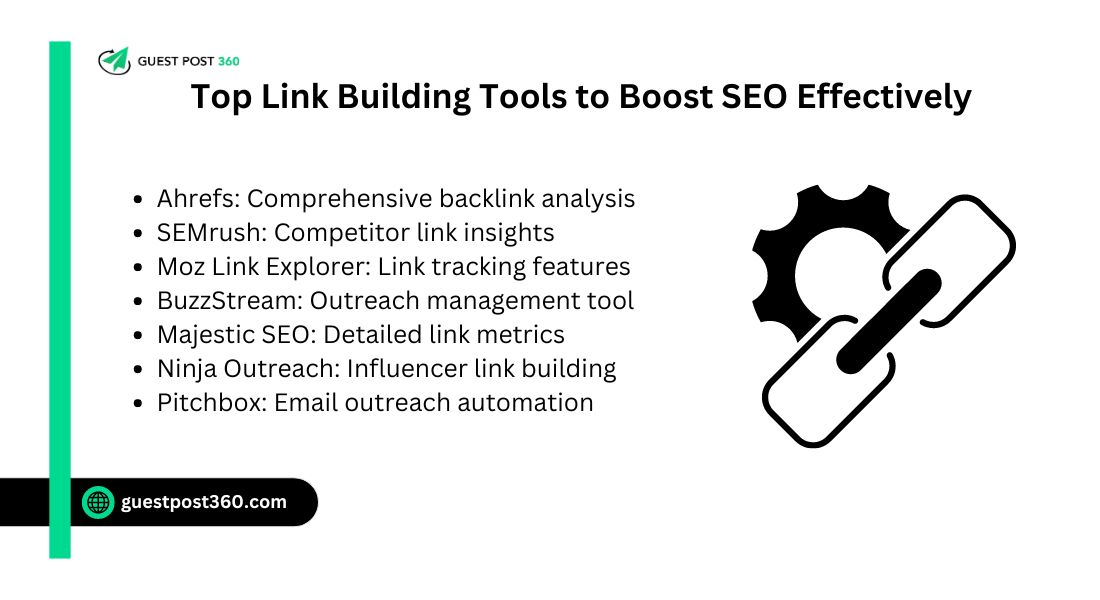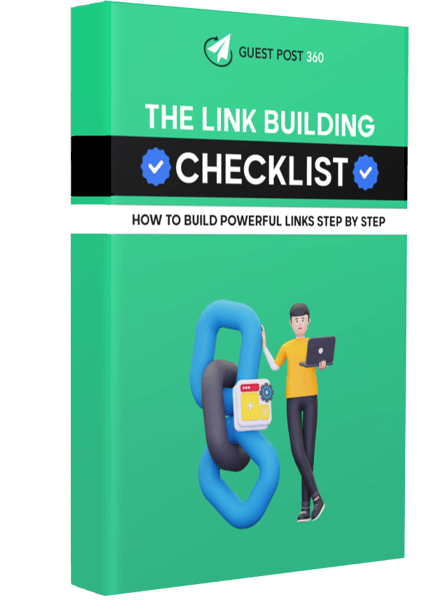Looking for the best link building tool to enhance your SEO strategy? A solid link building tool can simplify the entire process of acquiring high-quality backlinks, helping your site rank better on search engines. These tools analyze backlink opportunities, track competitors, and manage outreach campaigns. Whether you’re a beginner or an SEO expert, having the right tool can save time and boost your overall performance.
Using a reliable link building tool allows you to identify relevant websites and create connections that improve your site’s authority. Many tools offer features like backlink audits, link monitoring, and even automatic outreach. By utilizing these tools, you’ll build a stronger online presence and drive more traffic to your site, all while improving your search rankings
Table of Contents
ToggleWhat is a link building tool?
A link building tool is software designed to help website owners and marketers acquire backlinks from external sites. Backlinks, also known as inbound links, are a significant ranking factor for search engines like Google. With a link building tool, you can streamline the process of finding backlink opportunities, analyzing your current link profile, and tracking progress over time.
The primary goal of any link building tool is to automate and simplify the task of building high-quality backlinks. These tools typically offer features like identifying potential linking sites, tracking competitors’ links, and providing detailed metrics on your backlink performance. By using such tools, marketers can avoid manual link-building efforts, which can be time-consuming and inefficient.
Another important aspect of a link building tool is its ability to analyze the quality of backlinks. Not all backlinks are created equal, and a good tool helps you focus on acquiring links from authoritative and relevant sites. This ensures that the backlinks you build positively impact your site’s ranking.
Overall, a link building tool is an essential part of any SEO toolkit. It helps you stay organized, track results, and optimize your efforts to acquire high-value links, ultimately boosting your website’s authority and visibility on search engines.
How does a link building tool improve SEO?
A link building tool improves SEO by helping you acquire quality backlinks, which are a major ranking factor for search engines. Backlinks signal to search engines that your website is reputable and valuable, making it more likely to rank higher in search results. By using a link building tool, you can identify high-authority websites that are relevant to your industry, boosting your chances of getting backlinks that actually improve your rankings.
Using a link building tool also allows you to efficiently manage and scale your link-building efforts. These tools typically come with features that automate the outreach process, enabling you to contact multiple website owners with personalized emails. This not only saves time but also increases your chances of securing backlinks, which directly contributes to better SEO performance.
Moreover, a link building tool helps you track the effectiveness of your backlink strategy. Most tools provide detailed reports on the number and quality of backlinks you’ve gained, along with metrics like domain authority and traffic impact. With this data, you can refine your approach and focus on securing links from high-quality sources, improving your overall SEO results.
In conclusion, by leveraging a link building tool, you can optimize the process of acquiring backlinks, manage your outreach campaigns effectively, and monitor the impact on your SEO. This leads to better search engine rankings, more organic traffic, and overall improved website performance.
What features should a link building tool have?
A good link building tool should offer several key features to ensure that you can effectively manage your backlink strategy. One of the most important features is backlink analysis, which allows you to see the quality, quantity, and sources of backlinks pointing to your site. This helps you understand your current link profile and identify areas for improvement.
Another essential feature in a link building tool is competitor analysis. This allows you to see which websites are linking to your competitors, helping you find new opportunities for your own site. By analyzing your competitors’ backlinks, you can create a targeted strategy to build links from similar or better sources.
Outreach management is also a crucial feature of any link building tool. The best tools offer automated email outreach features that allow you to send personalized messages to website owners at scale. This feature saves time and increases the likelihood of securing backlinks from high-quality sites.
Finally, a link building tool should offer reporting and tracking features that allow you to measure the success of your campaigns. You should be able to see how many backlinks you’ve gained, the quality of those links, and how they’ve impacted your website’s ranking. These insights help you adjust your strategy and improve your link-building efforts over time.
Why are backlink audits important in link building tools?
Backlink audits are an essential feature of any link building tool because they help you evaluate the quality and health of your website’s backlink profile. A backlink audit identifies harmful or low-quality backlinks that could negatively impact your SEO. If your site has too many toxic links, it could result in a penalty from search engines, which is why regular audits are crucial.
A link building tool makes it easier to perform these audits by automatically scanning your backlink profile and identifying problematic links. With a comprehensive audit, you can disavow harmful links and ensure that only high-quality backlinks are contributing to your SEO. This helps protect your website’s ranking from potential penalties.
Backlink audits performed through a link building tool also provide valuable insights into the effectiveness of your link-building strategy. You can see which backlinks are driving the most traffic, which links are from authoritative sites, and whether your efforts are improving your overall SEO. This data allows you to adjust your strategy to focus on building high-quality backlinks.
In addition, regular backlink audits help maintain a healthy link profile in the long term. As websites constantly change, old or broken links may no longer be valuable, so a link building tool ensures your backlink strategy remains effective over time.
How do I choose the best link building tool?
Choosing the best link building tool depends on your specific needs, budget, and the scale of your SEO efforts. If you’re just starting with SEO, you may want to look for a tool that is user-friendly and provides all the basic features, such as backlink analysis, outreach management, and competitor tracking. A beginner-friendly interface can make it easier to manage your link-building campaigns without getting overwhelmed.
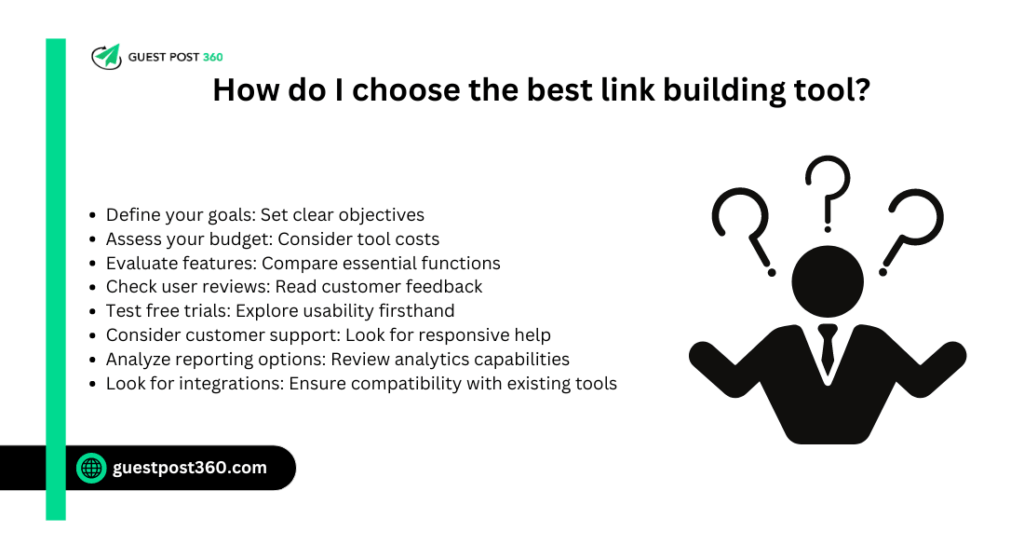

For more advanced users, the best link building tool should offer in-depth data analytics and advanced features like automated outreach, link tracking, and integration with other SEO tools. It’s important to choose a tool that can scale with your growing SEO needs. Look for tools that offer customizable options for outreach and detailed reports that provide insights into link performance.
Another factor to consider when choosing a link building tool is whether it fits within your budget. Some tools offer free versions with limited features, while others provide paid plans with more comprehensive options. Before deciding, compare several tools and check whether they provide value for money in terms of the features they offer.
Finally, make sure the link building tool you choose has strong customer support and resources, such as tutorials, guides, and a responsive help desk. A tool with good support will save you time and help you get the most out of its features as you work on building high-quality backlinks.
How can link building tools track competitor backlinks?
One of the standout features of a link building tool is its ability to track competitor backlinks. This function helps you understand where your competitors are getting their backlinks and gives you insights into potential opportunities for your own site. By analyzing competitor backlink profiles, you can identify websites that are likely to link to your content as well.
A link building tool typically provides a list of your competitors’ backlinks along with detailed metrics, such as the domain authority of the linking site and the anchor text used. This data allows you to assess the quality of your competitors’ backlinks and replicate or improve upon their strategy. By targeting the same high-authority sites, you can strengthen your own backlink profile and boost your SEO performance.
Tracking competitor backlinks using a link building tool also helps you discover new outreach opportunities. If a site has linked to your competitor, they might be interested in linking to you, especially if you can offer better content or resources. This insight saves time in identifying relevant sites for your own link-building campaigns.
In addition, a link building tool can provide alerts when your competitors gain new backlinks, keeping you informed of their SEO progress. This enables you to stay competitive and adapt your link-building strategy in real time, ensuring you remain ahead in the SEO race.
Can a link building tool automate outreach?
Yes, many link building tools offer features that can automate outreach, making the process of acquiring backlinks much more efficient. Outreach is a time-consuming aspect of link building, as it involves contacting multiple website owners, pitching your content, and following up with potential leads. A link building tool that automates outreach can significantly reduce the workload while increasing the chances of securing quality backlinks.
Automation in a link building tool usually works by allowing you to create personalized email templates that can be sent out to multiple recipients in bulk. These emails can be customized to include details like the recipient’s name, their website, and the specific content you are pitching. This feature helps maintain a personal touch while speeding up the outreach process.
Some link building tools also come with automated follow-up sequences, ensuring that potential link partners are contacted multiple times without manual intervention. This helps increase response rates and keeps your outreach efforts consistent. Additionally, many tools integrate with email platforms, making it easy to track responses and manage conversations in one place.
By automating outreach, a link building tool allows you to focus on other aspects of your SEO strategy while still maintaining a robust link-building campaign. This increases efficiency and maximizes your chances of acquiring valuable backlinks from relevant and authoritative sites.
What are the best link building tools for beginners?
For beginners, the best link building tools are those that offer a simple and intuitive interface while still providing the essential features needed to build high-quality backlinks. Tools like Moz Link Explorer and SEMrush are great starting points as they provide comprehensive backlink analysis, competitor tracking, and outreach capabilities, all in an easy-to-use package.
A beginner-friendly link building tool should offer clear tutorials and guides to help users understand how to leverage the tool effectively. Tools like Ahrefs, for instance, provide extensive resources for learning how to track and build backlinks, making it a popular choice for beginners. These tools simplify the process of identifying link-building opportunities and managing outreach efforts.
Additionally, some tools like Ubersuggest offer free or low-cost plans with limited features, which can be beneficial for beginners who are just starting their SEO journey. These tools allow users to get comfortable with backlink analysis and outreach without making a large financial commitment. They also provide insights into link-building strategies that can be scaled as the user becomes more experienced.
Overall, the best link building tool for beginners should combine ease of use with powerful features, allowing newcomers to quickly get up to speed with the basics of link building while offering room to grow as they advance in their SEO efforts.
What are the top advanced link building tools for experts?
For SEO experts, the best link building tools offer advanced features and in-depth analysis that can fine-tune a link-building strategy. Ahrefs is one of the top choices for experienced SEO professionals due to its comprehensive backlink index, competitor analysis, and ability to track new and lost links in real-time. The tool also provides data on domain authority, anchor text, and the quality of the backlinks, allowing experts to make informed decisions about where to build links.
Another excellent link building tool for experts is SEMrush. It offers advanced features like backlink audits, toxic link identification, and in-depth competitor analysis. This tool allows experts to monitor their backlink profiles over time and adjust their strategies based on competitor behavior. SEMrush also integrates well with other SEO tools, providing a seamless workflow for SEO professionals managing large campaigns.
Majestic is another powerful link building tool designed for advanced users. It offers unique metrics like Trust Flow and Citation Flow, which help SEO experts assess the quality of backlinks more accurately. Majestic’s extensive database of backlinks is perfect for users who need to conduct deep research and find high-quality link opportunities across various niches.
Advanced link building tools often come with features like automated outreach, detailed reporting, and integration with other SEO software. These tools allow experts to scale their link-building efforts efficiently, ensuring they stay competitive in high-ranking positions on search engines.
Should I use free or paid link building tools?
When deciding whether to use free or paid link building tools, it’s important to consider your specific needs and goals. Free tools, such as Ubersuggest and Google Search Console, offer basic features like backlink tracking and competitor analysis. These tools can be effective for smaller websites or those just starting with SEO. However, they may lack the advanced features required for more comprehensive campaigns, such as automated outreach and detailed backlink audits.
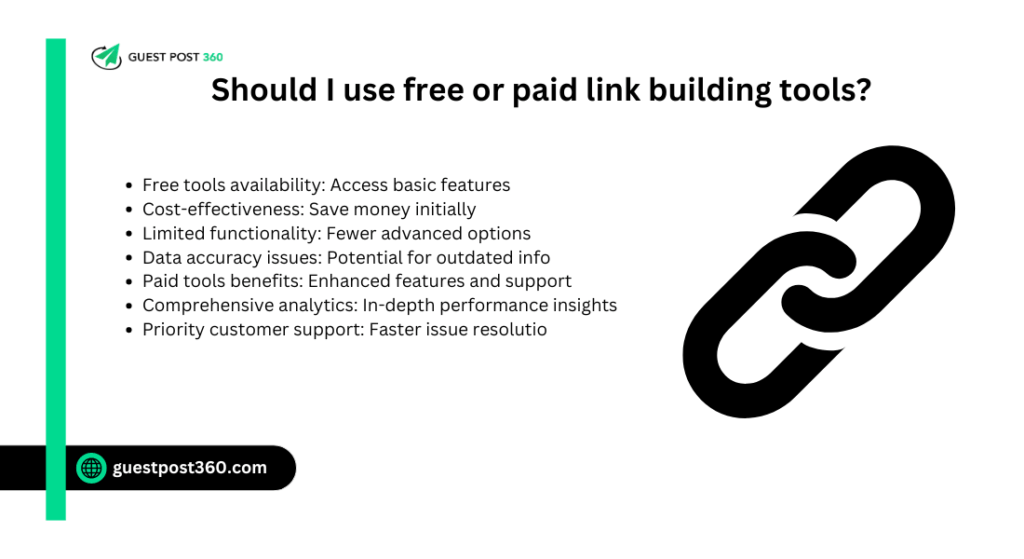

Paid link building tools like Ahrefs, SEMrush, and Moz provide a more extensive set of features, including advanced analytics, outreach management, and deeper competitor insights. These tools are usually better suited for larger websites or businesses that need to scale their link-building efforts. While the cost of paid tools can be significant, the return on investment can often justify the expense due to the time saved and the quality of insights provided.
One of the key advantages of using a paid link building tool is access to real-time data and more detailed reports. This allows users to stay ahead of competitors by identifying new backlink opportunities and adjusting strategies based on up-to-date metrics. Additionally, paid tools often come with better customer support, which can be crucial for troubleshooting and getting the most out of the software.
Ultimately, whether you choose free or paid link building tools depends on the scale of your SEO efforts and your budget. For small websites, free tools may suffice, but larger projects will benefit from the comprehensive features and support offered by paid tools.
How does a link building tool enhance link strategy?
A link building tool enhances link strategy by streamlining the process of finding, analyzing, and acquiring high-quality backlinks. It helps marketers and SEO professionals identify relevant websites and influencers within their niche, making it easier to build meaningful connections that improve their website’s authority. The tool allows users to track backlinks in real-time and monitor the effectiveness of their campaigns.
One way a link building tool enhances your strategy is by providing insights into the types of backlinks that are driving the most traffic and boosting search engine rankings. By focusing on quality over quantity, the tool helps users refine their strategy to target authoritative sites. This ensures that each backlink acquired adds significant value to the website, improving both SEO performance and domain authority.
The ability to automate outreach is another way a link building tool boosts link-building efforts. Instead of manually reaching out to potential backlink partners, the tool allows you to manage and personalize outreach campaigns at scale. Automated follow-up sequences increase the likelihood of securing high-quality backlinks, all while reducing the time and effort required.
Additionally, a link building tool helps maintain a clean backlink profile by identifying and disavowing harmful or low-quality backlinks. This keeps your website in good standing with search engines and protects it from potential penalties, ensuring long-term success in your link-building efforts.
What mistakes should I avoid when using link building tools?
One of the most common mistakes when using a link building tool is focusing solely on the quantity of backlinks rather than the quality. While it may be tempting to acquire as many backlinks as possible, links from low-authority or irrelevant sites can harm your SEO. A better strategy is to use your link building tool to focus on securing high-quality backlinks from reputable, industry-related websites.
Another mistake is neglecting to monitor and update your backlink profile regularly. Even if you’re using a link building tool, backlinks can become outdated or irrelevant over time. Links from penalized or spammy sites can negatively impact your rankings, so it’s essential to use your tool to audit your backlinks periodically and disavow harmful ones.
Failing to personalize your outreach efforts is another error that many users of link building tools make. While these tools often automate outreach, it’s important to customize your messages to potential link partners. Sending generic emails can decrease your response rate and lead to fewer backlinks. Always tailor your outreach emails to the specific website and highlight the value you bring.
Finally, some users rely too heavily on automation and fail to track the results manually. While a link building tool can provide detailed reports and metrics, it’s still important to review your progress regularly and adjust your strategy accordingly. Ignoring the data could result in wasted efforts and missed opportunities for valuable backlinks.
How do I track backlinks with a link building tool?
Tracking backlinks with a link building tool is crucial for understanding the effectiveness of your SEO strategy. Most tools provide a dashboard where you can monitor the backlinks pointing to your website, including key metrics such as domain authority, link quality, and referral traffic. This data allows you to assess how well your link-building efforts are contributing to your overall SEO performance.
One of the benefits of using a link building tool is its ability to track new and lost backlinks in real-time. You can quickly see when a website has linked to your content and when any links have been removed or become inactive. This helps you stay on top of your backlink profile and take action if valuable links are lost or if toxic links need to be disavowed.
Additionally, a link building tool allows you to evaluate the quality of each backlink by showing metrics like the linking site’s domain authority, relevance to your niche, and potential traffic impact. This enables you to focus on building links from authoritative and relevant sources, which are more likely to boost your search engine rankings and drive meaningful traffic to your site.
By tracking backlinks with a link building tool, you can also identify patterns and trends in your link profile. For example, you can see which types of content attract the most backlinks and which strategies are yielding the highest-quality links. This insight allows you to optimize your link-building campaigns and continuously improve your SEO performance.
Can I integrate a link building tool into my SEO workflow?
Yes, integrating a link building tool into your SEO workflow is not only possible but also highly beneficial. Many SEO tools, like Ahrefs, SEMrush, and Moz, are designed to seamlessly integrate with other software used in SEO campaigns, such as Google Analytics, Google Search Console, and CRM platforms. This allows you to streamline your processes and manage your link-building efforts alongside other important SEO tasks like keyword tracking, content optimization, and site audits.
A link building tool becomes an essential part of your workflow by automating the time-consuming aspects of link acquisition, such as outreach and backlink tracking. This frees up time for you to focus on content creation, technical SEO, and strategy refinement. The tool also helps you maintain consistency in your link-building efforts, as it can send reminders and notifications when new backlinks are gained or lost, ensuring that no opportunity is missed.
Moreover, integrating a link building tool allows you to keep all of your SEO data in one place. This makes it easier to generate comprehensive reports that show how your link-building efforts are impacting your overall SEO performance. Whether you’re managing multiple websites or running a large-scale campaign, having a centralized platform simplifies decision-making and ensures that your strategies are aligned with your SEO goals.
Using a link building tool in your SEO workflow also promotes collaboration within teams. Many tools offer multi-user access, allowing SEO professionals, content creators, and marketing teams to work together in building high-quality backlinks. This integration leads to a more cohesive SEO strategy and improved results across the board.
What are the future trends in link building tools?
The future of link building tools is likely to involve more automation, machine learning, and AI-powered features to enhance the efficiency and accuracy of link-building campaigns. As SEO continues to evolve, these tools will become smarter in identifying high-quality link opportunities and will be able to personalize outreach at scale with greater precision. This means that manual tasks will be reduced, and SEO professionals can focus on strategy and relationship building rather than execution.
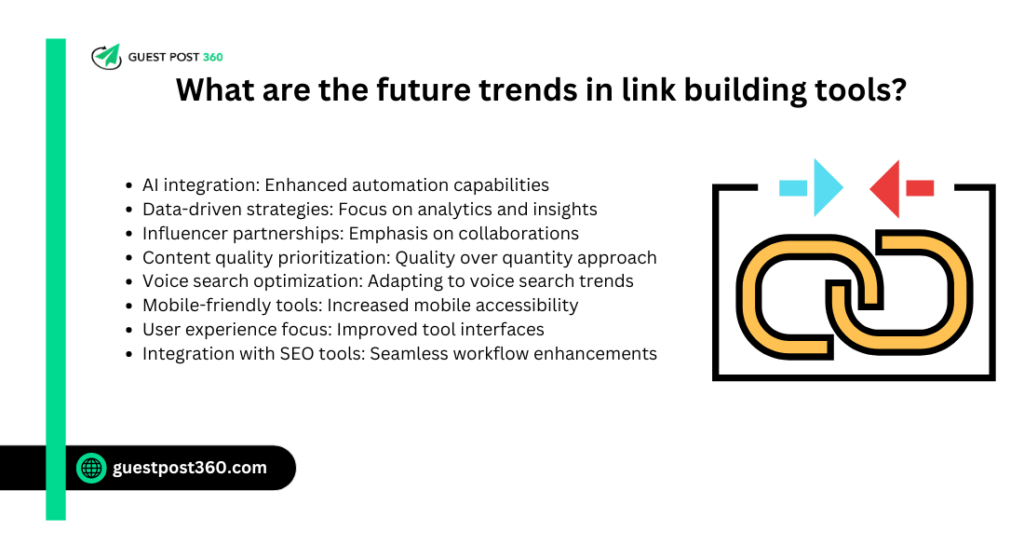

AI integration into link building tools will also likely result in more sophisticated backlink analysis. Machine learning algorithms could help identify patterns in backlink data that might not be immediately obvious to human users. This will allow marketers to predict trends, spot new opportunities, and adapt their link-building strategies more dynamically based on real-time data.
Another trend in the future of link building tools is the increased focus on protecting against negative SEO. As backlink profiles become more important, the tools will need to offer better monitoring capabilities to detect harmful or toxic backlinks early on. This will help website owners maintain a healthy backlink profile and avoid potential penalties from search engines.
Lastly, future link building tools may integrate more seamlessly with other digital marketing and SEO platforms. For example, tools may offer deeper integration with content marketing platforms or social media tools to help marketers build backlinks through multiple channels, improving their overall online presence and authority. As SEO becomes more holistic, the role of link building tools in this ecosystem will continue to grow.

